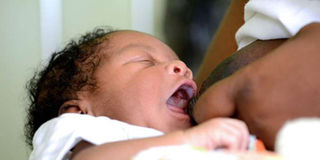Breaking News: At least 10 feared to have drowned in Makueni river
Italy to double baby bonus to fight declining birth rate

A mother breastfeeds her baby. Italy is proposing doubling the baby bonus incentive paid to low and middle-income families to encourage couples have more children to fight declining birth rates. AFP FILE PHOTO | JUNIOR D. KANNAH
What you need to know:
The country’s health minister’s proposal is to combat what she calls a catastrophic decline in the country’s birth rate.
Ms Lorenzin told the paper she wanted to double the standard baby bonus, currently 80 euros (Sh9,112) a month for low-to-middle income families.
Introduced last year, the allowances are currently payable only for babies born between January 1, 2015 and December 31, 2017 up to their third birthdays.
ROME, Sunday
A proposal to double Italy’s baby bonus incentive for couples to have more children has been made.
The country’s health minister’s proposal is to combat what she calls a catastrophic decline in the country’s birth rate.
“If we carry on as we are and fail to reverse the trend, there will be fewer than 350,000 births a year in 10 years’ time, 40 per cent less than in 2010 — an apocalypse,” the minister, Ms Beatrice Lorenzin, said in an interview published on Sunday by daily La Repubblica.
Ms Lorenzin told the paper she wanted to double the standard baby bonus, currently 80 euros (Sh9,112) a month for low-to-middle income families, and introduce higher payments for second and subsequent children to encourage bigger families.
Introduced last year, the allowances are currently payable only for babies born between January 1, 2015 and December 31, 2017 up to their third birthdays.
Ms Lorenzin wants to expand eligibility to all under-threes (thereby including those born before 2015) and to extend the provision for an additional three years, covering all babies born up until the end of 2020.
Higher-income families, those with taxable earnings of more than 25,000 euros (Sh2.8 million) per year, are not eligible for the scheme, excluding about a third of parents.
The allowances are paid at higher rates for the poorest — those declaring less than 7,000 euros (Sh797,300) a year to the taxman.
Under the new proposals, the payment for second and subsequent children would be 240 euros/month (Sh27,338) for average families and 400 euros/month (Sh45,563) for the poorest.
The minister is an influential member of Prime Minister Matteo Renzi’s centre-left government and would not have floated the increased payments without a green light from him, political commentators noted.
The proposals might, however, raise eyebrows in Brussels, where the European Commission is pressing Mr Renzi to move faster on cutting the country’s budget deficit as a way of bringing down its huge national debt.
The proposals would add 2.2 billion euros (Sh250.6 billion) to public spending over six years, estimates show.





